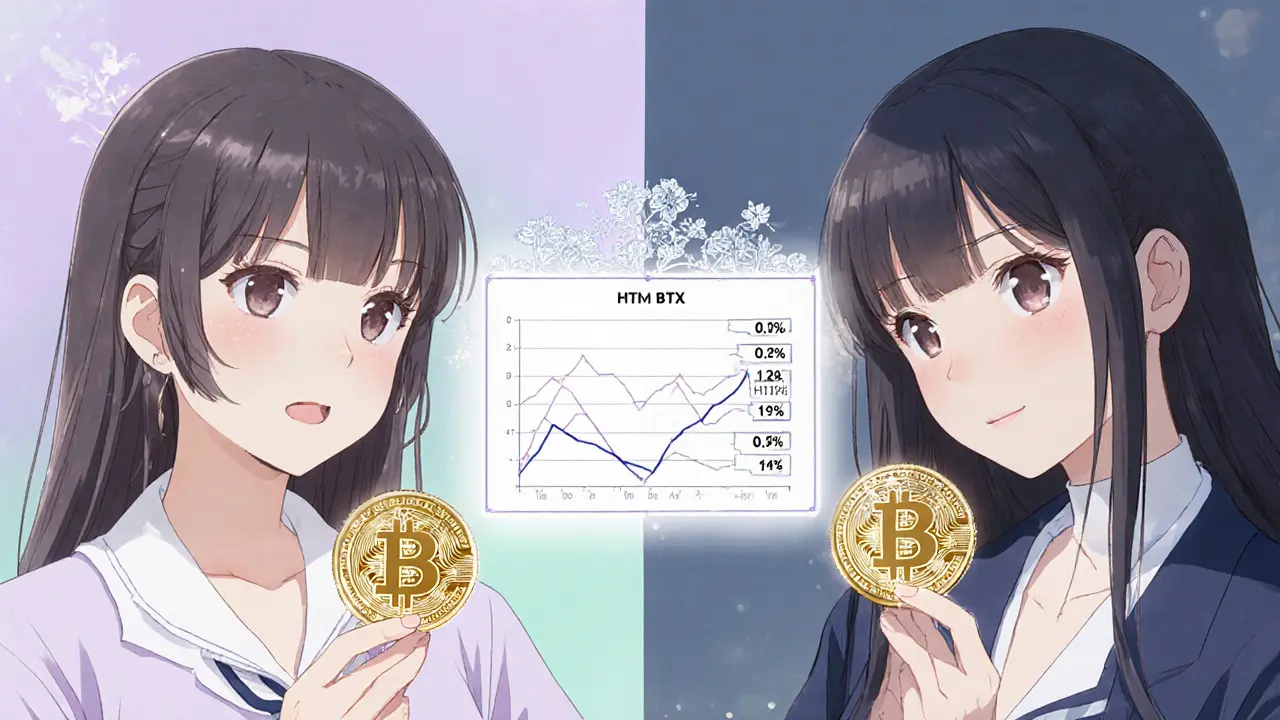Hubi Crypto Exchange Review 2025: Fees, Security & Features Compared
 Aug, 24 2025
Aug, 24 2025
Hubi vs HTX Fee Comparison Calculator
Compare Trading and Withdrawal Fees
Enter your trading amount to see how Hubi and HTX fees compare:
Fee Breakdown Comparison
Hubi
Flat 0.20% Fee
BTC Withdrawal: 0.0005 BTC (~$15)
HTX
0.10% - 0.15% Tiered
BTC Withdrawal: 0.0008 BTC (~$24)
| Metric | Hubi | HTX |
|---|---|---|
| Trading Fee | 0.20% | 0.10% - 0.15% |
| Bitcoin Withdrawal Fee | 0.0005 BTC (~$15) | 0.0008 BTC (~$24) |
| Assets Supported | ~150 | 600+ |
| Product Suite | Spot Only | Spot, Futures, Staking |
Fee Comparison Results
Hubi crypto exchange review often gets lost in the crowded world of digital asset platforms. If you’re hunting for a place to trade Bitcoin, Ethereum or emerging tokens, you probably wonder whether Hubi’s flat‑fee model and security stance really stack up. This article breaks down the exchange’s core specs, fees, security measures and how it measures against the more widely known HTX (formerly Huobi Global) - the rebranded heavyweight that dominates many rankings in 2025.
Quick Summary
- Flat 0.20% maker‑taker fee - simple but not the cheapest.
- Bitcoin withdrawal costs 0.0005BTC, about 40% below the industry average.
- Security details are sparse; no public Investor Protection Fund.
- Supports ~150 trading pairs, far fewer than HTX’s 900+.
- Best for traders who prioritize low withdrawal fees over extensive product suites.
What is Hubi?
When it comes to crypto trading platforms, Hubi is a cryptocurrency exchange that offers a flat 0.20% trading fee for both makers and takers. The service launched quietly and has kept a modest public profile, which means user‑generated content is limited. Nonetheless, the fee model is transparent: you pay the same rate regardless of volume, so there’s no need to chase tier thresholds.
Fee Structure Explained
According to a 2025 analysis by Cryptowisser a crypto‑exchange review site, Hubi’s 0.20% flat fee lands it squarely in the industry middle. The average across major exchanges hovers around 0.25%, but a growing number of platforms are undercutting that with 0.10%‑0.15% tiers. Hubi’s advantage is simplicity - you never have to calculate whether you qualify for a discount.
Here’s how that fee translates on a typical trade:
- Buy $5,000 worth of Bitcoin.
- 0.20% of $5,000 = $10 in fees.
- Effective cost = $5,010.
Compare that with a 0.10% tiered fee on a rival exchange: you’d only pay $5.
Withdrawal Costs
Hubi charges a fixed Bitcoin withdrawal fee of 0.0005BTC. With Bitcoin priced near $30,000 in October 2025, the fee is roughly $15 - noticeably lower than the 0.0008BTC (about $24) charged by many competitors. This fixed‑fee model can be a win for high‑volume traders who move funds often.
Security & Regulatory Snapshot
Public information on Hubi’s security architecture is thin. There is no mention of a cold‑storage ratio, multi‑factor authentication (beyond the standard email+SMS), or an Investor Protection Fund. In contrast, HTX operates a multi‑layer security protocol with cold storage and an Investor Protection Fund funded by 20% of quarterly profits. HTX’s fund, linked to the HT token a native utility token that backs the protection mechanism, provides an extra safety net for users.
Hubi’s corporate registration appears to be in Seychelles a jurisdiction known for crypto‑friendly licensing, but details on licensing or AML/KYC processes are not publicly detailed.

Platform Features & Asset Coverage
Hubi’s offering is intentionally lean:
- Spot trading only - no futures, options, or staking products.
- Approximately 150 listed assets, focusing on top‑tier coins.
- Web‑based interface with basic charting tools; no native mobile app reported.
By comparison, HTX provides spot, futures, staking, SmartEarn, launch‑pool and DAO governance features. HTX lists over 600 digital assets and more than 900 trading pairs, catering to both retail and institutional traders.
Comparison Table: Hubi vs HTX (2025)
| Metric | Hubi | HTX |
|---|---|---|
| Trading fee (maker/taker) | 0.20% flat | 0.10%‑0.15% tiered + VIP discounts |
| Bitcoin withdrawal fee | 0.0005BTC (~$15) | 0.0008BTC (~$24) |
| Supported assets | ~150 | 600+ (900+ pairs) |
| Product suite | Spot only | Spot, futures, staking, SmartEarn, DAO |
| Security features | Standard 2FA, no public fund | Cold storage, multi‑layer protection, Investor Protection Fund |
| Regulatory footprint | Registered in Seychelles, limited public KYC info | Offices in HK, KR, JP, US; growing regulatory credibility |
User Experience & Community Feedback
Because Hubi’s community footprint is small, there are few public reviews on Reddit or Twitter. The handful of comments that do appear praise the low withdrawal fee but criticize the lack of mobile app and limited asset list.
In contrast, HTX enjoys active discussion on platforms like CoinSutra, where users debate VIP membership benefits and the value of the HT token. BeInCrypto a crypto news outlet highlighted HTX’s “clear focus on product, execution, and user trust” as key growth drivers in early 2025.
Pros and Cons
- Pros
- Simple flat‑fee model - easy to predict costs.
- Competitive Bitcoin withdrawal fee.
- Low barrier to entry for beginners who only need spot trading.
- Cons
- Limited asset selection and no advanced products.
- Scarce security disclosures; no Investor Protection Fund.
- Minimal community presence and lack of mobile app.
Final Verdict
If your priority is a straightforward, low‑cost way to move Bitcoin in and out of an exchange, Hubi’s 0.20% fee and 0.0005BTC withdrawal charge are attractive. However, traders looking for a broad suite of products, deep liquidity, or robust security guarantees will likely find HTX a better‑rounded platform with extensive asset coverage and a proven security track record more suitable.
Frequently Asked Questions
What is the exact trading fee on Hubi?
Hubi charges a flat 0.20% fee on both maker and taker orders, regardless of trading volume.
How does Hubi’s Bitcoin withdrawal fee compare to the market?
At 0.0005BTC (about $15), Hubi’s fee is roughly 40% lower than the typical 0.0008BTC charge seen on most exchanges.
Is there an insurance or protection fund for Hubi users?
Publicly, Hubi does not disclose an Investor Protection Fund or similar insurance mechanism, unlike HTX’s fund backed by the HT token.
Can I trade futures or stake assets on Hubi?
No. Hubi currently offers only spot trading. Futures, staking, and other yield‑generating products are available on larger platforms like HTX.
Is Hubi regulated in my country?
Hubi is registered in Seychelles, but it does not publish detailed licensing information for specific jurisdictions. Users should verify local crypto regulations before depositing.

WILMAR MURIEL
August 24, 2025 AT 23:24Reading through the Hubi review really makes you appreciate how many dimensions there are to consider when picking an exchange. First, the flat 0.20% trading fee is simple, but it sits in the middle of the market, meaning you won’t get the lowest possible cost if you trade large volumes. Second, the Bitcoin withdrawal fee of 0.0005 BTC translates to roughly $15, which is a solid advantage over many platforms charging double that amount. Third, the limited asset list of about 150 tokens might feel restrictive for users who enjoy diversifying across newer projects. Fourth, the lack of an Investor Protection Fund or detailed security disclosures adds a layer of uncertainty, especially for those who prioritize safety. Fifth, Hubi’s registration in Seychelles offers a crypto‑friendly jurisdiction but does not replace the need for robust KYC and AML procedures. Sixth, the platform’s focus on spot trading only keeps the UI clean, yet it also means you miss out on futures, staking, and other yield‑generating products offered by competitors like HTX. Seventh, the user experience is straightforward, but the absence of a mobile app could be a deal‑breaker for traders who need on‑the‑go access. Eighth, community engagement appears minimal, which can make it harder to find peer support or shared strategies. Ninth, the security model mentions standard 2FA, yet without cold‑storage ratios disclosed, you’re left to trust the provider’s claims. Tenth, liquidity on Hubi may be sufficient for smaller trades, but larger orders could see slippage compared to deeper books on larger exchanges. Eleventh, the fee calculator embedded in the article is a handy tool to visualize potential savings. Twelfth, the consistent fee structure means you won’t have to monitor tier thresholds, simplifying budgeting. Thirteenth, for newcomers who value low withdrawal costs and a clear fee schedule, Hubi presents a compelling choice. Fourteenth, experienced traders seeking advanced products and extensive asset coverage will likely gravitate toward HTX. Fifteenth, overall, Hubi’s niche is clear: it serves traders who prioritize simplicity and low withdrawal fees over breadth of services, and that clarity can be a strength if it matches your trading style.
Joyce Welu Johnson
August 27, 2025 AT 06:57Wow, Hubi really keeps it simple! No tiered fees, just a flat 0.20% that anyone can understand. The withdrawal fee is a breath of fresh air, making it feel like the exchange actually cares about your pocket. Still, the limited asset list leaves you wishing for more excitement. Overall, it's a modest but steady platform.
Ally Woods
August 29, 2025 AT 08:57Sounds like another overpriced exchange.
Kristen Rws
August 31, 2025 AT 19:17i think hubi is pretty cool, its withdrawal fee is low and that helps a lot. its evn though not perfect, but for a start its good. hope they improve future!
Lisa Strauss
September 3, 2025 AT 00:04Hey folks, loving the positive vibes about Hubi’s low withdrawal costs! Even if the asset list is smaller, it’s great for beginners who just want to trade the big names without getting lost. Keep the optimism rolling, and maybe Hubi will expand their offerings soon!
Darrin Budzak
September 5, 2025 AT 13:10I’ve been watching the crypto exchange space for a while, and Hubi’s approach feels like a breath of fresh air in terms of fee transparency. The flat 0.20% fee removes the hassle of calculating tier thresholds, which can be confusing for newer users. However, the limited product suite means you’ll need to look elsewhere for futures or staking options. All things considered, it’s a solid niche player.
Andrew McDonald
September 7, 2025 AT 15:10While Hubi boasts a simplistic fee model, the absence of a comprehensive security framework raises concerns for serious traders. Without a disclosed cold‑storage ratio or an insurance fund, the platform seems under‑engineered for high‑value holdings. 🙂
Eugene Myazin
September 9, 2025 AT 22:44Hubi’s low Bitcoin withdrawal fee is a real plus, especially for those who move funds frequently. The simplicity of a flat trading fee makes budgeting easier, even if you miss out on the advanced tools that larger exchanges provide. It’s a good fit for the casual trader who values straightforwardness.
Latoya Jackman
September 12, 2025 AT 00:44From a risk‑management perspective, the lack of publicly available security metrics for Hubi is noteworthy. While the fee structure is transparent, investors should weigh the trade‑off between cost savings and the potential need for stronger custodial safeguards.
Janelle Hansford
September 14, 2025 AT 08:17Welcome to the discussion! If you’re weighing Hubi against bigger platforms, think about what matters most to your strategy. Low withdrawal fees can boost net returns, but limited assets might hinder diversification. Feel free to ask any follow‑up questions, and let’s help each other make informed choices.
dennis shiner
September 16, 2025 AT 10:17Oh great, another “simple” exchange. 🙄
Krystine Kruchten
September 18, 2025 AT 17:50In my experience, a clear fee schedule is defintely a strong point, and Hubi delivers on that front. The lack of a comprehensive security disclosure, however, is a downside that users should be aware of before committing large amounts.
Mangal Chauhan
September 20, 2025 AT 19:50Thank you for the thorough overview. It is evident that Hubi offers a user‑friendly fee structure, yet the limited product suite may not satisfy all investors. I would recommend conducting further due diligence on security practices before allocating significant capital. 😊